
The F. W. Woolworth Company was a retail company and one of the pioneers of the five-and-dime store. It was among the most successful American and international five-and-dime businesses, setting trends and creating the modern retail model that stores follow worldwide today.
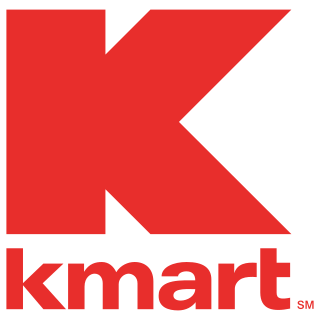
Kmart Corporation, now operated by Transformco, is an online retailer in the United States and operates six remaining Kmart big-box department stores — 3 in the US Virgin Islands and one each in Kendale Lakes, Florida ; Bridgehampton, Long Island; and Tamuning, Guam.
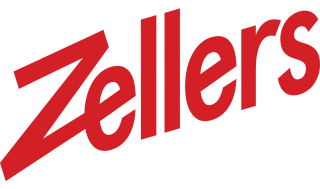
Zellers was a Canadian discount store chain founded by Walter P. Zeller in 1931. It was acquired by the Hudson's Bay Company (HBC) in 1978, and after a series of acquisitions and expansions, peaked with 350 locations in 1999. However, fierce competition and an inability to adapt during the retail apocalypse resulted in Zellers losing significant ground in the 2000s.

A variety store is a retail store that sells general merchandise, such as apparel, auto parts, dry goods, toys, hardware, furniture, and a selection of groceries. It usually sells them at discounted prices, sometimes at one or several fixed price points, such as one dollar, or historically, five and ten cents. Variety stores, as a category, are different from general merchandise superstores, hypermarkets, warehouse clubs, grocery stores, or department stores.
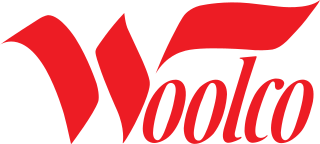
Woolco was an American-based discount retail chain. It was founded in 1962 in Columbus, Ohio, by the F. W. Woolworth Company. It was a full-line discount department store unlike the five-and-dime Woolworth stores which operated at the time. At its peak, Woolco had hundreds of stores in the US, as well as in Canada and the United Kingdom. While the American stores were closed in 1983, the chain remained active in Canada until it was sold in 1994 to rival Walmart, which was looking to enter the Canadian market. All of the former UK Woolco stores were sold by Kingfisher, which had bought the UK Woolworth business, to Gateway which subsequently sold them to Asda.
Aldi is the common company brand name of two German multinational family-owned discount supermarket chains operating over 12,000 stores in 18 countries. The chain was founded by brothers Karl and Theo Albrecht in 1946, when they took over their mother's store in Essen. The business was split into two separate groups in 1960, that later became Aldi Nord, headquartered in Essen, and Aldi Süd, headquartered in Mülheim.
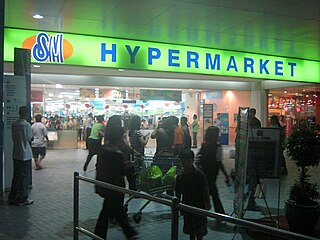
A hypermarket is a big-box store combining a supermarket and a department store. The result is an expansive retail facility carrying a wide range of products under one roof, including full grocery lines and general merchandise. In theory, hypermarkets allow customers to satisfy all their routine shopping needs in one trip. The term hypermarket was coined in 1968 by French trade expert Jacques Pictet.

A warehouse club is a retail store, usually selling a wide variety of merchandise, in which customers may buy large, wholesale quantities of the store's products, which makes these clubs attractive to both bargain hunters and small business owners. The clubs are able to keep prices low due to the no-frills format of the stores. They are distinguished from traditional cash-and-carry wholesale businesses in that their warehouses are substantially larger in size, and they do not cater purely to businesses but also allow some or all types of consumers to obtain memberships. They are also distinguished from warehouse stores in that they usually charge annual membership fees, and require presentation of proof of membership at the warehouse entrance and again at the point of sale.

McCrory Stores or J.G. McCrory's was a chain of five and dime stores in the United States based in York, Pennsylvania. The stores typically sold shoes, clothing, housewares, fabrics, penny candy, toys, cosmetics, and often included a lunch counter or snack bar. They also exclusively sold Oriole Records, one of the most popular 'dime store labels' from 1921 to 1938.

A big-box store is a physically large retail establishment, usually part of a chain of stores. The term sometimes also refers, by extension, to the company that operates the store. The term "big-box" references the typical appearance of buildings occupied by such stores.

Bottom Dollar Food is a defunct American soft-discount grocery chain. It was a subsidiary of Delhaize America, the U.S. division of international food retailer Delhaize Group. Its headquarters was in Salisbury, North Carolina.
Walmart Canada is a Canadian retail corporation and the Canadian branch of the U.S.-based multinational retail conglomerate Walmart. Headquartered in Mississauga, Ontario, it was founded on March 17, 1994, with the purchase of the Woolco Canada chain from the F. W. Woolworth Company.
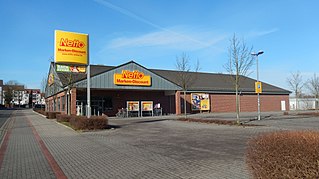
Netto Marken-Discount is a German discount supermarket chain owned by the German supermarket cooperative Edeka Group, and operates mostly in the south and west of Germany. The company reached its 1000th store in 2004, then aggressively expanded to the 4000th store in 2009, making it the largest discounter in Germany.

Seaway Mall is an enclosed shopping mall in Welland, Ontario, Canada. The mall has 500,000 square feet (46,000 m2) of space and includes tenants such as Sport Chek, Cineplex Entertainment, Winners and Shoppers Drug Mart.

Globe Discount City and Globe Shopping City was a chain of discount department stores that operated beginning in 1960. Globe stores were located in the Southwest United States and were operated as a "big-box store" retail arm of Walgreens for much of the chain's operational lifecycle. Massive financial losses led to the dispersal of the entire chain through a combination of liquidation sales and transferral of individual store locations in 1978. An independently-run Globe Discount City Store continued until its closure in 1999.














